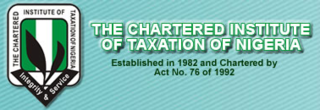An accountant is a practitioner of accounting or accountancy. Accountants who have demonstrated competency through their professional associations' certification exams are certified to use titles such as Chartered Accountant, Chartered Certified Accountant or Certified Public Accountant, or Registered Public Accountant. Such professionals are granted certain responsibilities by statute, such as the ability to certify an organization's financial statements, and may be held liable for professional misconduct. Non-qualified accountants may be employed by a qualified accountant, or may work independently without statutory privileges and obligations.

The Chartered Institute of Taxation (CIOT) is a registered charity and the leading professional body in the United Kingdom concerned solely with taxation. The CIOT deals with all aspects of direct and indirect taxation.
Chartered accountants were the first accountants to form a professional accounting body, initially established in Scotland in 1854. The Edinburgh Society of Accountants (1854), the Glasgow Institute of Accountants and Actuaries (1854) and the Aberdeen Society of Accountants (1867) were each granted a royal charter almost from their inception. The title is an internationally recognised professional designation; the certified public accountant designation is generally equivalent to it. Women were able to become chartered accountants only following the Sex Disqualification (Removal) Act 1919 after which, in 1920, Mary Harris Smith was recognised by the Institute of Chartered Accountants in England and Wales and became the first woman chartered accountant in the world.

The Association of Chartered Certified Accountants (ACCA) is the global professional accounting body offering the Chartered Certified Accountant qualification (CCA). Founded in 1904, It is now the fourth-largest professional accounting body in the world, with 252,500 members and 526,000 student members. ACCA's headquarters are in London with principal administrative office in Glasgow. ACCA works through a network of over 110 offices and centres in 51 countries - with 346 Approved Learning Partners (ALP) and more than 7,600 Approved Employers worldwide, who provide employee development.

The South African Institute of Chartered Accountants (SAICA), South Africa’s pre-eminent accountancy body, is widely recognised as one of the world’s leading accounting institutes. The institute provides a wide range of support services to more than 48,000 members and associates who are chartered accountants (CAs(SA)), as well as associate general accountants (AGAs(SA)) and accounting technicians (ATs(SA)).
The Hong Kong Institute of Certified Public Accountants is the professional accounting body of Hong Kong.
A tax advisor or tax consultant is a person with advanced training and knowledge of tax law. The services of a tax advisor are usually retained in order to minimize taxation while remaining compliant with the law in complicated financial situations. Tax Advisors are also retained to represent clients before tax authorities and tax courts to resolve tax issues.

The Institute of Public Accountants (IPA) is one of the three legally recognised professional bodies for accountants in Australia. The IPA represents more than 25,000 voting members working in industry, commerce, government, academia and professional practice.

The Institute of Chartered Accountants of Nigeria (ICAN) is a professional accountancy body in Nigeria. It is one of the two professional accountancy associations with regulatory authority in Nigeria, the other being the Association of National Accountants of Nigeria (ANAN). The relationship between the two organizations has been tense. In 2007 ICAN attempted to have a bill declaring ANAN void.
The Global Accounting Alliance (GAA) is an international coalition of accounting organisations that was formed in 2006.
The Association of National Accountants of Nigeria (ANAN) is one of the two professional accountancy associations with regulatory authority in Nigeria, the other being the Institute of Chartered Accountants of Nigeria (ICAN). A consultant offering financial services in Nigeria must be a member of either ANAN or ICAN.

The Chartered Institute of Taxation of Nigeria (CITN) is a professional organization in Nigeria whose members are certified as qualified tax practitioners or administrators.
The Pan African Federation of Accountants (PAFA) is the regional body that is aimed to represent African professional accountants with one and louder voice, particularly in relating with International Federation of Accountants (IFAC). It was inaugurated in Dakar, Senegal on 5 May 2011.
The West African Union of Tax Institutes (WAUTI) is an association formed by the Chartered Institute of Taxation of Nigeria (CITN) and the Chartered Institute of Taxation of Ghana (CITG) with the objective of developing and promoting the taxation profession in West Africa. A nationally recognized taxation institute or organization in a West African country is eligible for full membership.
Prince Rasaq Adekunle Quadri is a Nigerian accountant who was President of the Chartered Institute of Taxation of Nigeria (CITN) from 2009 to 2011, and was elected the first President of the West African Union of Tax Institutes (WAUTI) in March 2011.

The Chartered Institute of Taxation, Ghana (CITG) is the regulator of the practice of taxation in Ghana. It is the only body in Ghana that can certify tax professionals.
The Association of African Tax Institutes (AATI) is an industry association whose aim is, among other things, to provide a platform of collaboration between tax professionals in Africa and to help bridge the divide between tax professionals in the countries of member bodies, their governments and taxpayers.

The South African Institute of Professional Accountants (SAIPA) is a professional association of accountants based in South Africa. As of 2019, the institute claims to have more than 10,000 members.

Chartered Accountants Australia and New Zealand is a professional accounting body, with over 138,204 members in Australia, New Zealand and overseas. CA ANZ focuses on the education and lifelong learning of members, and engage in advocacy and thought leadership in areas of public interest that impact the economy and domestic and international markets.









